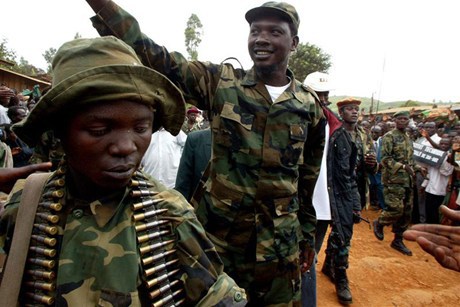Daniel Huchla
Imagine: In the midst of an armed conflict, a mass of unarmed women and children in a remote village have been unceremoniously executed by armed forces. Under the laws of armed conflict, such acts would certainly create liability for war crimes.[i] However, it is surprising that if the soldiers or their commander that committed this crime were under the age of eighteen they would not be subject to jurisdiction at the International Criminal Court (“ICC”).[ii]
The International Criminal Court (“ICC”) is an international judicial body, designed as an alternative to International Criminal Tribunals which are restricted to specific jurisdictions and conflicts.[iii] Jurisdiction of the ICC is dependent upon the consent of sovereign nations through signature and ratification of The Rome Statute.[iv] Designed to address issues of crimes against humanity and war crimes, the ICC incorporates elements from prior treaties including The Hague and Geneva Conventions. One of the Rome Statute’s contributions to the law of war has been establishing that the usage of child soldiers as a war crime.[v] However, the rule does create a somewhat anomalous situation when considered in the totality of the statute.

Map depicting ratification of the Rome Statute of the International Criminal Court[vi]
The Convention on the Rights of the Child, through its effects upon domestic law, does slightly narrow the gap by obligating signatories to prioritize older candidates recruiting soldiers that are between the ages of fifteen and eighteen.[x] This may serve to shorten the window in which soldiers might be unaccountable for their actions. Alternatively, the Optional Protocol to the Convention on the Rights of the Child, requiring specific safeguards prior to the recruitment of soldiers under the age of eighteen.[xi] Additionally, the protocol attempts to raise the age of recruitment to 18 for “armed groups that are distinct from the armed forces of a State . . . .”[xii] However, the Optional Protocol has not been as widely ratified as the Convention on the Rights of the Child.

Image advocating for the ratification of the Optional Protocol to the Convention on the Rights of the Child.[xiii]
There are extreme situations that might warrant the use of combatants within this limited age range. States as sovereign entities have an interest and right to ensure the continued existence of its peoples. Some variables to be considered are the duration of the conflict, the extent of casualties, the overall population of the nation, and the average life expectancy. As these variables shift, the interest of defense may render the recruitment of soldiers under the age of eighteen necessary for some nations. In times of crisis it is perhaps understandable that every “able-bodied [individual]” be called for the defense of the nation.[xiv]
However, the gap in the Rome Statute’s jurisdiction still remains in which a combatant under the age of eighteen might commit violations of the law of armed conflict. The International Criminal Court balances this situation by allowing liability to be asserted against other individuals, specifically commanding officers.[xv] The Rome Statute provides that a commanding officer exercising “effective command and control” 1) “knew or . . . should have known that the forces were committing . . . crimes; and 2) . . . failed to . . . prevent . . . or to submit the matter . . . for investigation and prosecution.”[xvi] Although the ICC lacks jurisdiction to address crimes committed by individuals between the ages of fifteen and eighteen, domestic governments are capable of addressing the crimes. Through the establishment of a command responsibility standard that requires a commanding officer to submit the matter for investigation and prosecution, the ICC ensures that the issue will be handled domestically.

A child soldier recruited by Thomas Lubanga’s Force patriotique pour la libération du Congo. © Reuters
The Rome Statute, through command responsibility effectively requires domestic national governments to address all crimes committed by soldiers and especially those committed by combatants under the age of eighteen. Ironically, nations that make use of combatants in this age range might hold them to a higher level of liability than the ICC might themselves be comfortable. Or worse yet, they might hold them to a significantly lower level of liability. In either event, the ICC would be powerless to challenge a domestic ruling under the doctrine of ne bis in idem[xvii], because any domestic trial of a minor would not be designed to shield them from criminal responsibility before the ICC. In this situation, if a commanding officer complied with the requirements sufficiently to avoid personal liability, victims could be effectively deprived of justice. Perhaps an effort should be made to close this loophole in which minors are able to avoid criminal liability?
Daniel Huchla is a third year law student at the University of Baltimore and a graduate of Miami University with a Bachelor of Music. During his undergraduate studies, he performed in an International Opera Festival located in Brazil. He also serves as Associate Managing Editor for the University of Baltimore Law Review. Areas of interest include Administrative Law, International Humanitarian Law, International Criminal Law, and National Security Law. He is currently a Law Clerk with the Law Offices of McCabe, Weisberg & Conway.
[i] Rome Statute of the International Criminal Court, Art. 8 [hereinafter “Rome”], https://www.icc-cpi.int/NR/rdonlyres/EA9AEFF7-5752-4F84-BE94-0A655EB30E16/0/Rome_Statute_English.pdf.
[ii] Rome, Art. 26.
[iii] Compare Rome; with Statute of the International Tribunal for Rwanda, http://www.icls.de/dokumente/ictr_statute.pdf.
[iv] Rome Art. 4(2).
[v] Rome Art. 8(2)(b)(xxvi).
[vi] http://www.iccnow.org/?mod=ratimp.
[vii] Id.
[viii] Convention on the Rights of the Child, Art. 38(2), http://www.ohchr.org/EN/ProfessionalInterest/Pages/CRC.aspx.
[ix] Rome Art. 26.
[x] Convention on the Rights of the Child, Art. 38(3).
[xi] Optional Protocol to the Convention on the Rights of the Child, Art. 3(3) [hereinafter “Optional Protocol”], http://www.ohchr.org/EN/ProfessionalInterest/Pages/OPACCRC.aspx.
[xii] Optional Protocol, Art. 4.
[xiii] https://childrenandarmedconflict.un.org/mandate/opac/.
[xiv] See e.g. 10 U.S.C. § 311 (2016).
[xv] Rome Art. 28.
[xvi] Id.
[xvii] Rome Art. 20.

